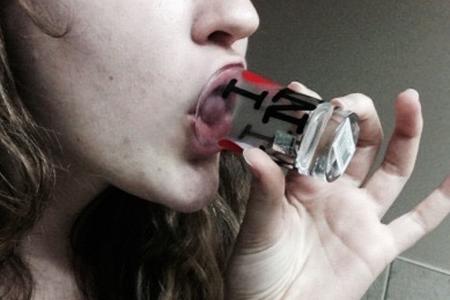Internet fads: Sad, bad or just plain mad?
Experts say taking part in silly, even risky Internet fads is cry for attention
When he was called out on social media to perform the Ice Bucket Challenge, he did it because he did not want to lose face.
Mr John Tan, 25, a civil servant, said: "All my friends and acquaintances can see it. So if I didn't do it, I would seem like an unsporting and selfish person."
For the challenge, participants dump buckets of ice or water over their heads to raise awareness about neurodegenerative disease amyotrophic lateral sclerosis (ALS).
Mr Tan felt that it was a "novel concept and an interesting way to raise funds and gain awareness for a cause".
But many netizens who take part in Internet fads do so regardless of whether it is for a cause or not.
One of the latest fads include sticking a pen under the breasts as a test of "true womanhood". This apparently started in China.
Then, there are the dangerous ones such as planking and taking selfies from the top of a building while perching precariously.
Just last Monday, The New Paper ran a report about how a teen illegally climbed a pyramid in what is believed to be part of a global trend where teens take pictures of their legs from atop a high structure such as the top of a building.
Other fads are just silly, like the Condom Challenge, while others are weird, like the Kylie Jenner Lips Challenge.
Despite all these, people are doing it for attention and for entertainment, experts said.
A social media expert, Mr Lars Voedisch, 42, managing director at PRecious Communications, said: "In general, attention seeking is about the concept of personal affirmation through attention.
"It is scientifically proven that affirmation makes us happy - and social media 'likes' and comments can have the same effect as getting people to laugh at a joke you tell in a cafe or praise for a good grade in school."
Weird and novel ideas usually get attention, which increases their chances of going viral, said Ms Belinda Ang, 34, founder and director of thinkBIG Communications.
She said: "The more novel it seems, the likelihood of it turning into a movement is much higher. This is especially so if it is tied to a seemingly worthy cause."
But Ms Ang feels that it is more of a social trend than just mere social media fad.
'SEEKING VALIDATION'
She said: "We are facing a generation who are likely to be more narcissistic, but (are), at the same time, attempting to seek identity and validation through attention. And social media, in its nature, is a perfect medium for showing and sharing."
When a movement is driven with a positive tonality, it quickly propels a positive energy across the world, said Ms Ang.
But when it is driven with a negative connotation, the opposite is true.
Said Mr Voedisch: "The main issue for me is that some of those fads encourage dangerous or disrespectful attitudes or behaviour.
"It's similar to the global debate of what is beauty and how the advertising industry is slowly changing."
Ms Ang had this to add: Do not succumb to peer pressure.
She said: "Don't do anything that you may feel uncomfortable with or you think might have a detrimental impact on your future, because one must remember that the Internet has a permanent memory and it may create a certain impression of yourself that you don't intend to."
DON'T CENSOR
But, said Ms Ang, it is not a good idea for parents to censor and stop their children from using the Internet, as it will only arouse more curiosity.
She said: "In the growing years into an adult, youngsters are trying to realise their individualism and value in this world. They seek comfort on social media, whether for constant engagement with 'the world', to seek attention or finding acceptance."
She suggested that parents share the content and discuss it openly with their children.
"This way, children are able to judge on their own if such an act is for the good or bad," she said.
We are facing a generation who are likely to be more narcissistic, but (are), at the same time, attempting to seek identity and validation through attention. And social media, in its nature, is a perfect medium for showing and sharing.
- Ms Belinda Ang, founder and director of thinkBIG Communications

KYLIE JENNER LIPS CHALLENGE
How it works: Place lips in the mouth of a shot glass and suck to get lips like reality TV star Kylie Jenner.
Danger: The shot glass can break under pressure. If a person sucks for too long, the blood vessels around the lips can break, causing bruises.

CONDOM CHALLENGE
How it works: Fill a condom with water and drop it over the head of the person taking the challenge.

CINNAMON POWDER CHALLENGE
How it works: Swallow a tablespoon of cinnamon powder in 60 seconds.
Danger: It is damaging to the lungs and could cause an asthma attack.

THE ULTIMATE SELFIE
How it works: Take a selfie in risky situations.
Danger: At least 12 people have died while taking selfies.In May last year, an 18-year-old in Romania was electrocuted when she climbed on top of a train to take a selfie.

PLANKING
How it works: Lie face down in a public place.
Danger: In 2011, a man died when he fell from a balcony railing in Brisbane, Australia.
Get The New Paper on your phone with the free TNP app. Download from the Apple App Store or Google Play Store now



